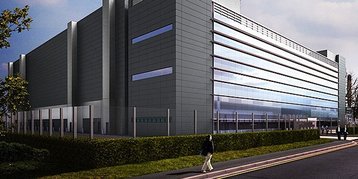In the big scheme of things, Equinix’ bid for British colocation provider Telecity is not a surprise - it has a strong interest in breaking up its target’s proposed merger with Interxion. But the company did a good job of pretending indifference to the deal since it was announced in February.
This week Equinix offered $3.5 billion for UK-based Telecity, in a deal which would extend Equinix’ lead in the European colocation market. Most people agree the $15 billion US giant’s objective is simple - to prevent Telecity from completing a $2 billion merger with Netherlands-based Interxion, which would create a serious competitor in the region
But a couple of weeks back, Equinix’ global CEO Steve Smith told DatacenterDynamics that the deal was not a concern. He admitted that the combination of Interxion and Telecity would be one third bigger than Equinix in Europe, but said that Equinix could command greater trust, in an exclusive interview at the opening of Equinix’ new LD6 data center in Slough.
Global presence required
Companies that want a global presence will trust Equinix, he told us. The business inside a data center might be transacted in milliseconds, but the business of the data center runs at an entirely different pace. Trust is gained over years and not easy to establish and, given that continuity is the most valued commodity, takes a long time to be transferred.
“All the major cloud service providers will create their own back office base in their own data centers. But even the likes of Facebook and Microsoft will turn to Equinix to host their services when they want put front offices close to their customers in every region of the world,” he said. “At the moment Equinix is seeing deals that Interxion and Telecity don’t get a look at.”
The Interxion-Telecity deal was a sign of consolidation in Europe, but in April Smith said global players like Equinix were more interested in growing their presence in emerging markets: “We’re getting deeper into China, South Africa and Brazil,” he said.
He did agree that there is still plenty of expansion to be had in Europe, the US and Asia Pacific, as more IT is moved out of enterprise data centers. We met him in Slough, in the UK leg of a world tour of new Equinix data centers round the world - mostly in developed markets - including five facilities in New York, Singapore, London, Melbourne and Toronto.
“Of all the IT spending in the word, only twenty percent is outsourced and eighty percent is still going on in-house development. Those 80 percent may want to get IT run in house but they will want to run it more efficiently in the cloud.”
Fast growth
Smith has led Equinix through what analysts have described as ‘exceptional growth’ since joining from Hewlett-Packard in 2007, extending Equinix’s reach beyond the US into new continents. Smith wasn’t a global CEO when he joined but the company does span the world now.
Since 2007 the company has forged strong ties with the financial services industry, and built up its cloud ecosystems, harnessing its global reach and focusing on interconnections, and filling its halls with IT service providers.
So, what is next?
Equinix is seeing deals that Telecity and Interxion don’t get a look at
“We’re spending $200 million in the US building out and we’re underpinning that with $700 million of capital. It’s all being driven ridden by demand for the cloud, mobile, the internet of things, big data and video,” said Smith, promising that future expansion would focus on the rapidly developing economies of China, South African and Brazil.
“The market has matured,” he told us. “These days lots of companies are building data centers so just putting up infrastructure is not a differentiator. The real secret sauce is made up of a number of ingredients that we are doing that nobody else is doing – yet.”
Cross-connects are the most potent flavor of the Equinix ‘secret sauce’, according to Smith. Having established itself as the virtual capital of the global internet, with facilities hosting all the major players in every crucial financial center, clients gravitate towards Equinix to get the fastest possible response times. Equinix has a critical mass of everyone who matters in industry and can place them in close proximity.
These are the most exclusive addresses on the digital global village and Equinix, as the builder, is creating a highly valuable property portfolio.
With 1200 cloud service providers hosted at Equinix, it does have a claim to being the facility of choice for the world’s content providers. This is where Faceboook, Google and AWS come when they have to plans to put one of their own data centers in any vicinity, Smith said: “They can’t get close to the customers in every location in the world. When they can’t they use us, which is quite a vote of confidence.”
Interconnects
Hard-wired is an overused term now, but the servers of global fund managers and brokers actually fit the description, as they are cabled by the shortest possible physical route an aisle or a closet’s breadth away from each other, as Equinix builds vertical market communities in its halls, dubbing them International Business Exchanges.
Building the Exchange Fabrics - a purpose built, proprietary set of comms links that creates almost instant communications between peers in any data hall – is something other data center vendor haven’t specialized in, Smith told us - and this is partly because of the development of the Internet in different regions.
European rivals (such as Telecity and Interxion) haven’t had to become exchanges, as independent internet exchanges do the job, Smith said. Equinix did it by necessity, picking up those skills to serve the needs of the US. So maybe independents like the London Internet Exchange, inadvertently gave Equinix a ‘secret sauce’ lead over its rivals.
Partners on board
The next step, Smith told us, is to extend this feature beyond being the financial services sector.
With the cloud available, no-one in their right mind - except a specialist - will want to run their own data center, argued Smith. There are too many disciplines involved in temperature control, power management and generation, all skills that are hard to acquire and expensive to purchase.
This goes for tech resellers as well as ernd users, which is why Equinix has announced a new channel strategy to recruit resellers, service providers and consultants.
Partners will be able to refer Equinix services, with enterprise customers receiving assistance from the channel community they usually work with. Channel partners will help enterprises use Equinix Cloud Exchange to build hybrid clouds strategies and create new revenue streams through implementing Equinix’ Performance Hub.
Equinix partners (which include AWS, Cisco, Google Cloud Platform, IBM SoftLayer, Microsoft Azure and NetApp) ensure that any cloud service running off its infrastructure is as good as it can possibly get, he said. Equinix channel partners will have global reach, business continuity and a launch pad to a booming global market.
Analysts are watching with interest. “I like Equinix,” Clive Longbottom, senior researcher at market analyst Quocirca told us, ”sure, its occupation rate is still pretty low, but it understands what it needs to do as a colo provider and as a value investment for its customers.”
The interconnectivity between its sites and connections to public clouds create the foundation on which companies feel confident enough to move on to additional services, he said. “It helps when a company sets up in an optimised manner and that others won’t become noisy neighbours.
The channel is a new challenge where it might struggle, according to Longbottom’s analysis. “Equinix has to be able to define what services it provides that can be sold through to customers, and what are just base services that the channel itself depends on,” he said.
This may call for a more active role from the facilities provider. Equinix may need to become a front end cloud broker, if not a cloud integrator in order to cater for clients. This could lead to contention with its own channel and customers, says Longbottom.
Despite recent criticism of the colocation business model, Longbottom says it has a strong head of steam: “Equinix, with its proven track record, is well positioned to capitalize on both the co-lo and facility-based cloud markets.” .



